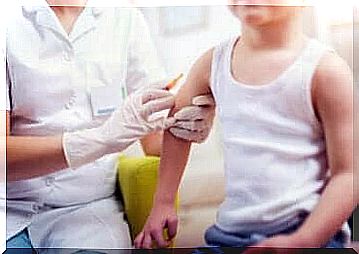All About Mumps And The Importance Of Vaccination

Mumps, or parotitis, is an infectious disease that can be either acute or chronic. It affects one or both of the glands near the ear, which are responsible for producing saliva. These glands are located behind the ascending parts of the jaw.
In this article you will learn all about mumps that is caused by a virus of the genus Paramyxoviridae. While it usually occurs in children and teens, it can also infect susceptible adults.
In addition, mumps can affect other glands in the body, nervous system, and testicles.
Before the universal vaccine was developed, mumps was an endemic disease around the world. It affected most children between the ages of two and fifteen. Since the vaccine was invented, the incidence has fallen sharply. In fact, there are now only occasional outbreaks in Latin America.
The virus that causes mumps is usually transmitted through the air when infected people release virus particles when they sneeze, cough or talk.
The symptoms of mumps

Some people infected with the mumps virus have very mild or even no signs or symptoms. If symptoms do occur, they usually appear about two to three weeks after exposure to the virus.
The main symptom of mumps is inflammation of the salivary glands that causes the person’s cheeks to swell. In addition to this characteristic swelling, patients may also experience:
- pain in the swollen salivary glands on one or both sides of the face.
- pain when chewing or swallowing.
- fever.
- headache and muscle pain.
- weakness and fatigue.
- loss of appetite.
Complications
Fortunately, mumps rarely causes complications. Nevertheless, we list below some of the possible complications that can arise from this virus infection:
- hearing loss.
- miscarriages in pregnant women.
- heart rate abnormalities.
While not very common, the complications can be potentially serious. Most involve inflammation of a body part.
In addition to the salivary glands, about a third of men with mumps also develop inflammation of one or both testicles. This complication is known as orchitis. Fortunately, while this complication can cause infertility, it rarely does.
Another complication that mumps can cause in girls and women is inflammation of the ovaries, although this is uncommon.
Finally, in rare cases, mumps can also cause inflammation of the central nervous system. This can lead to meningitis or encephalitis.
How can you prevent mumps?

The best way to prevent mumps is without a doubt the MMR vaccine. This vaccine prevents measles, mumps and rubella. It offers both individual and collective protection.
The MMR vaccine is part of the childhood vaccination schedule. Children are given two doses, one at 12 months of age and one at 9 years of age. At this point you have to remember that most vaccines are not 100% effective and not everyone has their child vaccinated. Therefore, there can always be some isolated cases.
It is worth noting that there was an outbreak of mumps in America in 2019, as there was a problem with certain doses of the vaccine. The vaccine is 95% effective, but children vaccinated between 1995 and 1998 and between 1985 and 1988 have significantly lower protection.
Treatment of mumps
Mumps is a viral infection. Therefore, treatment focuses on reducing the symptoms. This is also called a symptomatic treatment. It is based on the administration of NSAIDs (Non-Steroidal Anti-Inflammatory Drugs) and giving rest.
In addition, diet is another important factor to take into account. The patient’s ability to eat depends on his or her condition. Therefore, many resort to soft diets. However, if the patient can and wants to eat, there is no need to restrict their diet.
Doctors do not prescribe antibiotics for this condition, as these drugs are only effective against bacterial infections. They do not work against viral infections. Once an outbreak occurs, it is recommended that each case be reviewed and re-vaccinated if in doubt.









